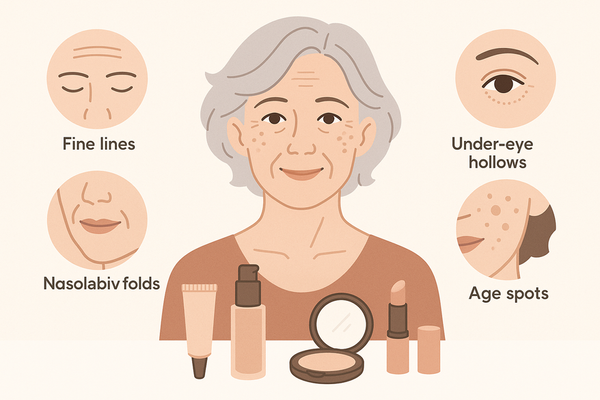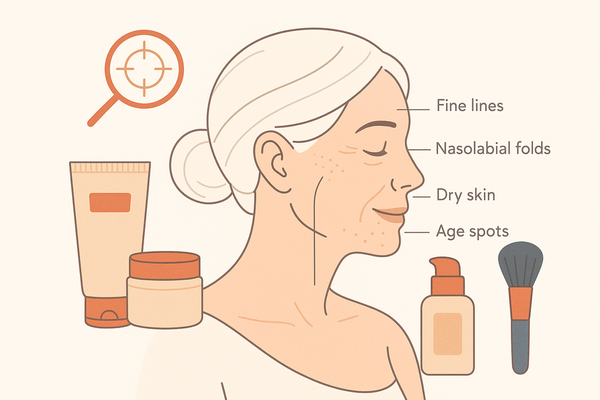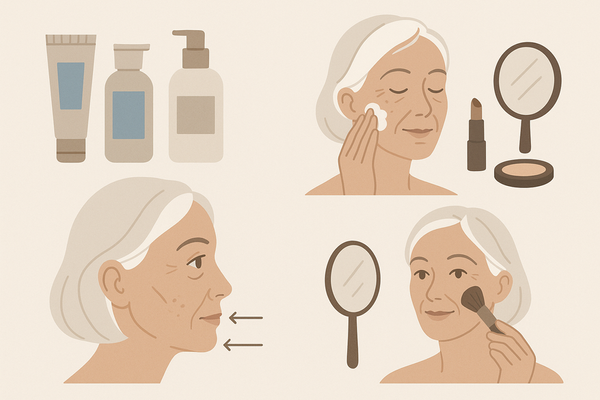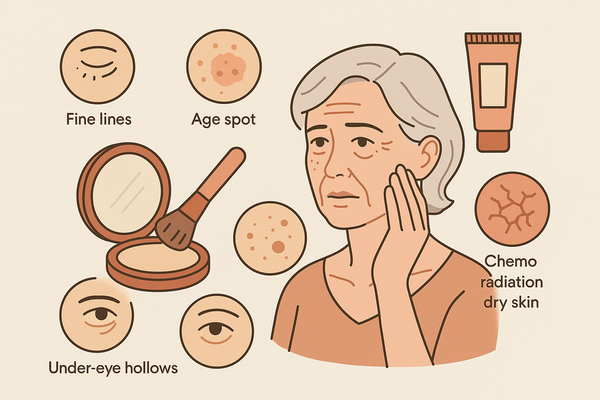Future-Proof Makeup Trends with AI: How Artificial Intelligence Is Shaping Beauty’s Next Era
Discover how future-proof makeup trends with AI are revolutionizing beauty through personalization, innovation, and sustainability for brands and enthusiasts alike.
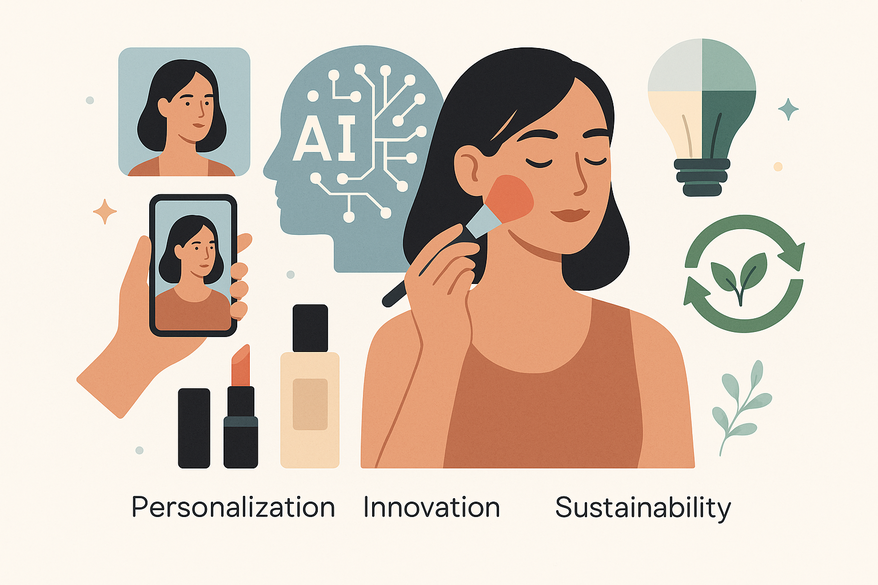
7 min read
Key Takeaways
- AI-driven personalization transforms shade matching and product suggestions for every skin type.
- Augmented reality experiences and virtual try-ons boost engagement and conversion rates.
- Predictive analytics empower brands to forecast trends, optimize inventory, and reduce waste.
- On-demand and custom creation through smart devices and subscription models is the next frontier.
- Sustainability and holistic wellness gain momentum via AI-powered ingredient selection and closed-loop systems.
Table of Contents
- Understanding the Role of Artificial Intelligence in Makeup
- Current Makeup Trends Influenced by AI
- Future-Proofing Strategies in the Makeup Industry
- Predictions for Future-Proof Makeup Trends with AI
- Conclusion
As beauty evolves at warp speed, future-proof makeup trends with AI have become essential for brands and enthusiasts alike. Future-proof makeup trends with AI are practices, products, and techniques that leverage artificial intelligence to ensure enduring relevancy, adaptability, and innovation in the beauty sector. According to Cinemamakeup, these trends drive long-term success by combining data-driven insights with creative flair. Teal-Studio adds that AI-powered solutions, from skincare diagnostics to virtual try-ons, help brands anticipate consumer needs and deliver personalized experiences (top-6-trends in the makeup industry 2025; what top beauty experts won’t tell you).
Brands can also leverage the capabilities of Makeup Check AI to generate personalized makeup suggestions and real-time shade matches. This integration streamlines product development and enhances customer experiences.
For industry professionals, staying ahead of future-proof makeup trends with AI means mastering rapid tech shifts and evolving consumer behaviors. It translates to faster product development, smarter marketing, and stronger customer loyalty. For makeup enthusiasts, these trends unlock custom looks, instant feedback on shade matches, and engaging digital experiences (for more on AI-driven coaching).
This post will define key concepts, showcase current applications, outline strategic tactics, and forecast what’s next in beauty tech.
1. Understanding the Role of Artificial Intelligence in Makeup
Artificial intelligence refers to computer systems designed to simulate human intelligence processes—learning, reasoning, and problem-solving. In beauty, AI blends machine learning, computer vision, and data analytics to deliver smarter tools and services.
Current AI applications in beauty
- Virtual try-on tools: Augmented reality apps let users preview makeup looks digitally before buying, cutting purchase risk and boosting satisfaction (see our virtual makeup try-on guide).
- Personalized recommendations: AI algorithms analyze skin tone, concerns, and preferences. For example, L’Oréal SkinConsult AI assesses aging signs in selfies to suggest tailored skincare and makeup.
- Smart devices: AI-powered foundation dispensers custom-mix shades on demand; “smart” brushes adapt stroke pressure based on skin texture feedback.
- Skin analysis platforms: From a single selfie, these systems map fine lines, pores, and pigmentation to recommend routines, bridging online consultations and in-store visits.
Benefits of AI integration
- Hyper-personalization: Brands craft formulations tuned to an individual’s genetics, environment, and lifestyle.
- Speed and accuracy: AI shortens shade-matching from minutes to seconds, reducing returns.
- Seamless omnichannel: Users shift from online AR try-ons to in-store smart kiosks without losing data or recommendations.
- Innovation fuel: Aggregated feedback drives R&D, inspiring products like climate-adaptive foundations or wellness-infused lip balms.
At a major beauty retailer’s tech demo, over 70% of participants preferred the AI shade-match preview over manual sampling—illustrating trust and engagement with data-driven tools.
2. Current Makeup Trends Influenced by AI
AI’s footprint in beauty retail and product development has grown rapidly. Algorithms now guide everything from creative direction to supply-chain decisions.
- Tech-integrated products: Smart dispensers that measure skin moisture and ambient light to mix perfect shades; vibrating brushes for even application; temperature-controlled eyelash curlers.
- Virtual and AR experiences: Shoppers using AR try-ons are up to 70% more likely to complete a purchase.
- Skin analysis engines: Lancôme’s E-Skin Expert and L’Oréal SkinConsult AI analyze selfies to propose routines, reducing guesswork.
- Data-driven development: Brands scan social media in real time with NLP to detect trends like “glowy skin” or “bold burgundy lip,” fueling limited-edition launches.
Case studies
- L’Oréal SkinConsult AI
– Serves thousands of global users weekly.
– Uses deep learning to refine recommendations, boosting repurchase rates by 25%.
– Data anonymization protects user privacy. - Lancôme E-Skin Expert
– Trained on diverse skin-type datasets for inclusivity.
– Integrates dermatologist-validated algorithms.
– Personalized routines raise satisfaction scores by 30%.
3. Future-Proofing Strategies in the Makeup Industry
Brands need agility backed by data to remain relevant. Key tactics include:
- AI-enabled predictive analytics: Forecast preferences and seasonal patterns to cut inventory waste by 20% (see our personalized AI makeup routines).
- Technology-driven services: Scale virtual consultations with chatbots trained on expert advice; deploy in-store kiosks for custom blends.
- Smart manufacturing: Automate fulfillment and sourcing, react to microtrends with on-demand runs.
- Social listening: AI scans platforms for product mentions and emerging looks, informing rapid tweaks and targeted campaigns.
These tactics reduce R&D missteps, speed trend-inspired launches, and create real-time feedback loops for fresh assortments.
4. Predictions for Future-Proof Makeup Trends with AI
Here’s what’s on the horizon:
- Intensified personalization: Real-time pigment formulation at the molecular level; DNA-based beauty plans integrating genetics and lifestyle.
- On-demand creation: At-home and in-store mixers that dispense custom serums and tints; subscription pods for “beauty 3D printers.”
- Holistic self-care: AI-driven ingredient selection targeting collagen stimulation and microbiome balance; wellness metrics from wearables guiding routines.
- Sustainability via AI: Demand prediction to reduce overproduction; blockchain-tracked closed-loop packaging systems.
- Next-gen AR & MR: Real-time tutorial overlays on smart glasses; dynamic digital looks merging virtual and physical cosmetics.
- Skincare-makeup convergence: Platforms suggesting integrated regimens across serums, primers, and supplements with biometric feedback.
Conclusion
AI is integral to personalization, virtual experiences, innovation, predictive analytics, and sustainability in beauty. Embracing these tools is critical to future-proof makeup trends with AI and maintain a competitive edge. Whether you’re an industry pro or a makeup lover, dive into AI-driven platforms, stay adaptable, and experiment boldly as technology reshapes beauty’s next era.
Future-proof makeup trends with AI will define how we create, shop, and wear makeup for years to come.
FAQ
- What is AI in makeup?
AI in makeup uses machine learning and computer vision to analyze skin and recommend products, automate shade matching, and power virtual try-ons. - How does AI improve shade matching?
AI scans skin tone, lighting, and texture in seconds to suggest accurate shades, reducing returns and enhancing satisfaction. - Can AI predict future beauty trends?
Yes—by applying natural language processing to social media and search data, AI forecasts emerging looks and consumer preferences. - Is my data safe with AI beauty tools?
Reputable platforms anonymize and encrypt user data, ensuring privacy while delivering personalized insights. - Will AI replace makeup artists?
AI complements artists by providing data-driven insights and tools, but human creativity and expertise remain essential.

